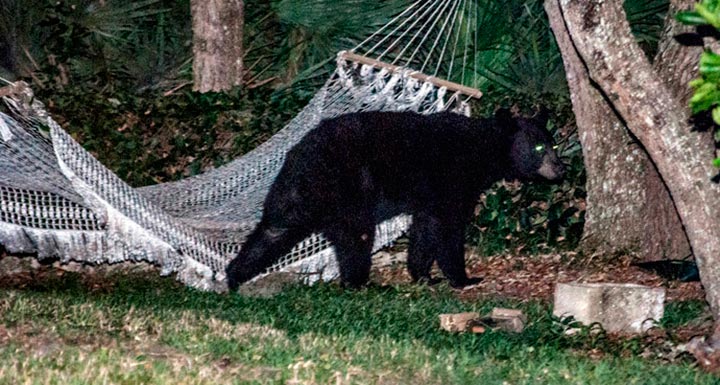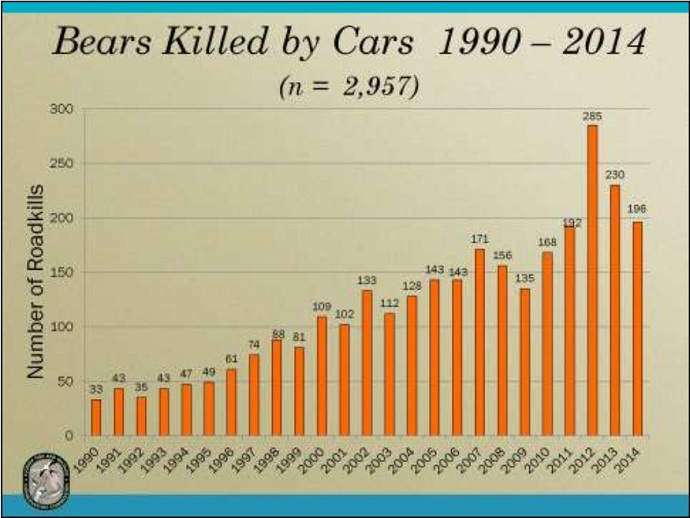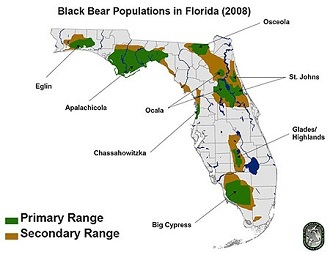
Florida considers hunting ban drop as bear maulings increase
Black bear attacks are on the rise in Florida, prompting the state to contemplate how to keep the growing population in check. The government may remove a 20-year ban on hunting the animal as bears increasingly start to be seen as a suburban menace.
In December, two Floridians were attacked by bears. At the beginning of the month, 68-year-old Jeanne Barber was walking her dog when it spotted a bear at a construction dumpster, the Orlando Sentinel reported.
The dog excitedly yanked at the leash, pulling her to the ground. Then the bear attacked, clamping its jaw around her arm. Her injuries were not life-threatening, but hers was the third attack in Central Florida’s Seminole County over the past year.
Less than three weeks later, a 15-year-old was attacked in the Panhandle’s Franklin County. Leah Rader was walking her dog, when it spotted a bear.
“The dog barked, and she saw a black shadow and the next thing she knew she was in a ditch,” her mom, Sheri Mann, told the Northwest Florida Daily News. “She said she was screaming and nobody could hear her. He bit her leg and started dragging her away.”
Rader had to undergo surgery for wounds to her head, neck, back and arms, the Miami Herald reported.
The Florida black bear has suffered several injuries of its own at the hands of humans: Nearly 200 bears were killed by vehicles in the state in 2014, down from a high of 285 in 2012, according to state officials. A 300-lb bear in the Big Cypress National Preserve area northwest of Miami-Dade County was struck and killed by an SUV in early December. The accident resulted in a second crash at the scene, the Herald reported. Three men subsequently died, while eight others were injured in the incident.
The species has made a rebound since it was put on the state-designated ‘threatened species’ list in 1974, when the population was as low as 300-500 bears. That designation was removed in 2012, according to Florida’s Fish and Wildlife Conservation Commission (FWC). At that point the state agency approved a management plan for the animal, which is a subspecies of the American black bear.
Currently, bears are protected by Florida’s Bear Conservation Rule, which says it is illegal to injure, shoot or kill bears in Florida; the only applicable defense to illegally take or attempt to take a bear is the Common Law Defense of Necessity. Bear hunting was closed in the state in 1994, and the 2012 management plan did not include a return to the activity.
Wildlife officers are now studying the recent growth in the Florida black bear population, which is now being counted for the first time since 2002. At that time, there were about 3,000 bears throughout the state, according to the 2012 report.
On Wednesday, the commission will deliver a follow-up report, and this one will address the idea of reintroducing hunting to the state. Of the 41 states with resident black bear populations, 32 allow hunting and using harvest as a population management tool, FWC said in its report. Florida is the only state in the South with more than 1,000 black bears that does not allow hunting.
“Don’t wait until there’s another attack,” Lyle McCandless, president of the Big Cypress Sportsmen’s Alliance, told the Herald, calling for a controlled hunt. “Now here we are with maulings happening. Unfortunately, this is something we should have addressed a lot earlier.”
Nick Wiley, executive director of the Florida Game and Freshwater Fish Commission, has said that the hunting strategy is not an “end-all and be-all solution.” But it’s time, he said, for the hunting option needs to be considered again, the Orlando Sentinel reported.
“There is no single answer to eliminating human/bear conflicts, but a comprehensive approach applying several measures together can greatly reduce the likelihood of serious incidents or attacks in the future,” Thomas Eason, director of habitat and species conservation for the FWC, said in the follow-up report.
The study proposes a one-week hunt in the fall on both public and private lands. Permits for in-state residents could cost as much as $100, while out-of-state residents might pay up to $300.
“Human safety comes first, and we’re doing everything we can to address the conflicts,” Eason told the Miami Herald. “Hunting is one tool in our toolbox. We don’t think hunting is going to be the solution to the conflicts. We do see it as a tool to reduce the overall number of bears as appropriate.”
The Big Cypress National Preserve has a “strong, healthy bear population that could sustain hunting,” he added.
But not everyone sees hunting as a good way to cull the growing population.
“A hunt will not solve the problem. People can solve it,” Laurie Macdonald, director of the Florida chapter of the Defenders of Wildlife, told Reuters.
A field test conducted by Florida wildlife officers found human-bear conflicts were reduced by 95 percent when residents used bear-proof garbage cans, according to the agency’s report.
“Killing bears deep in the woods who aren’t causing problems is the wrong approach,” Kate McFall of the Humane Society of the US told the Associated Press. “Voters want humane, effective solutions to conflicts with bears, such as bear-wise trash management, hazing and public education.”
The Humane Society of the United States on Tuesday released a survey finding that 61 percent of voters oppose a trophy bear hunt season, while just 25 percent are in favor, according to a news release.
(From: RT)



